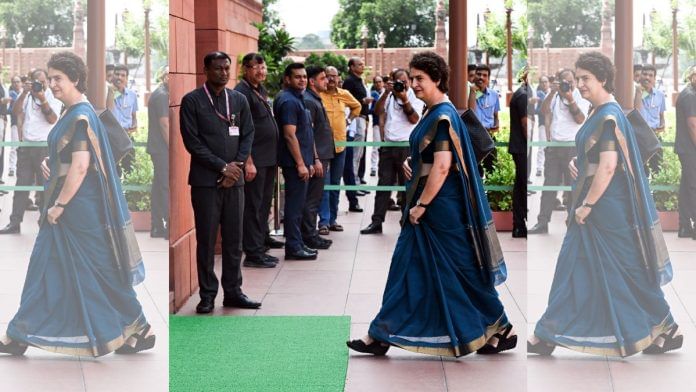New Delhi: Congress MP Priyanka Gandhi Vadra strongly opposed a parliamentary standing committee’s recommendations on regulating streaming platforms and social media content, warning that the proposals could stifle free expression and become a tool for political control.
The Wayanad MP suggested that safeguards were needed to enable news portals, YouTube channels, influencers, along with filmmakers, comedians and musicians to express their views without oppression by regulatory mechanisms.
She added that regulatory measures should not become an excuse to exert pressure or arm-twist social media intermediaries and individuals into suppressing, altering or limiting the reach of content for political or ideological reasons.
Priyanka made these suggestions in a Standing Committee on Home Affairs report titled ‘Cyber Crime—Ramifications, Protection and Prevention’ tabled in Parliament on Wednesday.
Additionally, Priyanka also doubled down on the dissenting opinions of her fellow party and Committee members, Ajay Maken, regarding the recommendations on the regulation of social media intermediaries, such as the periodic review of the legal immunity granted to them.
Priyanka and Maken are members of the 30-member committee headed by the BJP Rajya Sabha MP Radha Mohan Das Agrawal.
As part of its recommendations to regulate OTT content, the committee has recommended a periodic review of the immunity granted to these firms under the ambit of the Information Technology Act, 2000. Social media intermediaries are exempted from liability for hosting or transmitting third-party content on their platforms under section 79 of the IT Act.
“Especially with regard to operators of YouTube channels, news portals, influencers, comedians, musicians, film makers and digital news portals, safeguards should be provided for their ability to express and disseminate their views without oppression by regulatory mechanisms, harassment by agencies and other means of suppression. These measures should be clearly articulated and laid out,” Priyanka noted in her suggestions, which were included in the report.
“Regulatory measures should not be allowed to become excuses for pressurising or arm-twisting individuals, intermediaries, SSMI/SMI and IT companies into suppressing material, altering content or limiting the views of any content for political or ideological reasons. They should be confined to regulating the entities within the limits of legality, and for the express purpose of curbing Cybercrime of any kind. A clear policy regarding this distinction should be articulated and instituted,” she further suggested.
‘Practically inefficient’ and a potential ‘kill switch’
Priyanka also dissented on the committee’s recommendations to establish a mandatory national registration system for all intermediaries working in India, irrespective of their size or origin.
The committee had proposed the appointment of local grievance officers and increasing the number of nodal contact persons by appointing regional representatives for quick redressal.
However, Priyanka argued that several IT intermediaries were small firms and would not be able to afford such services.
“Many IT Intermediaries are small enterprises that may not be able to afford such appointments and services. It is advisable to allow those smaller than a defined size to operate without appointments of such nodal contact persons or local grievance officers and enforce this recommendation for such intermediaries that are in the position to afford the same. This distinction can be made according to standardised norms,” Priyanka suggested.
She also disagreed with recommendations to regulate OTT content through bodies similar to the Central Board of Film Certification, saying these moves would be highly problematic and would create a massive backlog.
She argued that the amount of content produced by OTT platforms is far greater than that produced by the entire film industry, and that these changes would seriously alter the distribution of content. This would subsequently hinder employment opportunities for many young people engaged in the industry, she argued.
The Standing Committee on Home Affairs noted that the absence of pre-release checks, unlike films that require mandatory certifications, and a weak age verification system left minors at risk of exposure to inappropriate content. To address this issue, the committee recommended establishing a recognised panel to monitor newly released content on these platforms.
“Aside from the extremely grave objections cited by my colleagues in their recommendations addressing the issue of the Fundamental Rights of Freedom of speech and expression being curtailed by the above recommendation, its implementation is likely to prove practically inefficient and virtually impossible,” Priyanka noted in her suggestions.
“The number of films produced by the entire Indian film industry is far exceeded by the number of films, videos, reels, and other content produced across the range of OTT platforms. Funnelling all these through a single, central board equivalent to the CBFC will create a massive backlog and regulation will become extremely problematic. This will also seriously affect the OTT industry in terms of the frequency and ease of content distribution which will in turn affect employment opportunities in which a large number of youth are now engaged,” she further emphasised.
Similarly, her party and committee colleague Maken expressed concern about the recommendations for a periodic review of the legal immunity extended to social media intermediaries under the IT Act, as well as the introduction of graded penalties for non-compliance with takedown orders, including “potential suspension of operations”.
“The vague call to “review” and “rebalance” the safe harbour principle threatens to dilute the crucial legal standard set by the Supreme Court in Shreya Singhal v. Union of India. This could compel platforms to engage in pre-emptive censorship of legitimate content—including critical journalism and civil society discourse—to avoid legal liability,” Maken noted.
On the recommendation of banning intermediary operations, Maken said that granting such power to the government would be dangerous and may act as a “kill switch” to coerce platforms into compliance with politically motivated demands.
“Granting the executive the power to suspend a platform’s operations is disproportionate and dangerous. It acts as a “kill switch” that can be used to coerce platforms into complying with politically motivated takedown demands, thereby silencing dissent and independent media,” Maken suggested.
(Edited by Sugita Katyal)
Also Read: Kerala govt’s broadband service gets major upgrade with OTT services, national ambition follows




